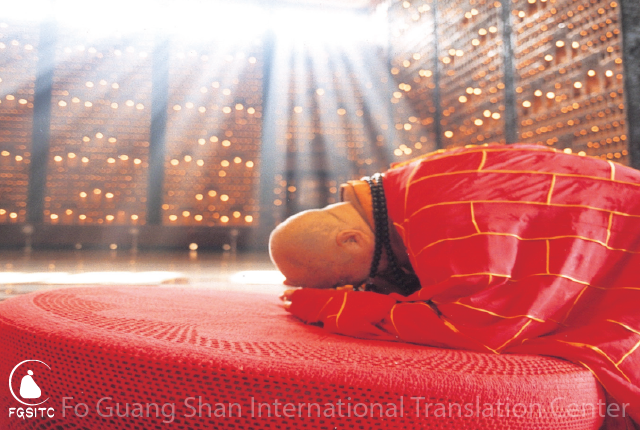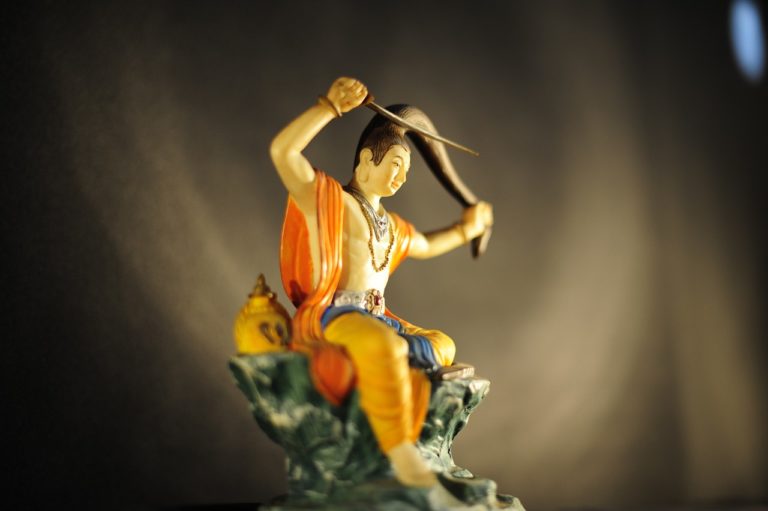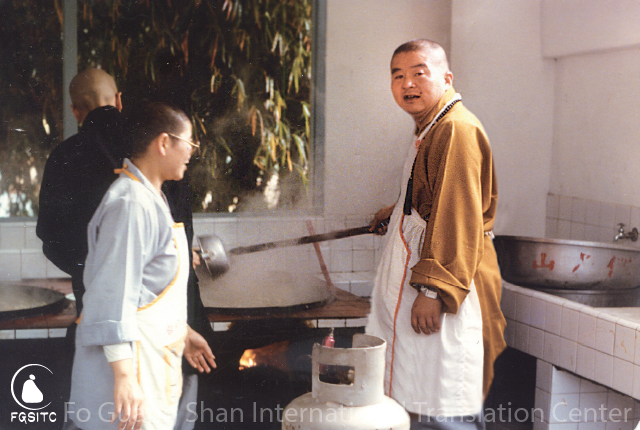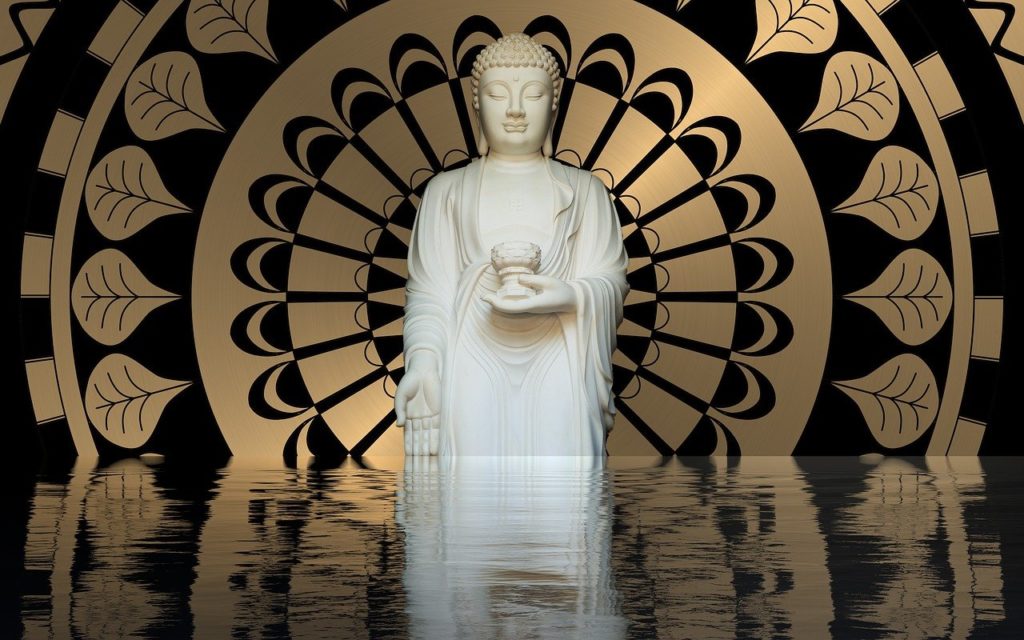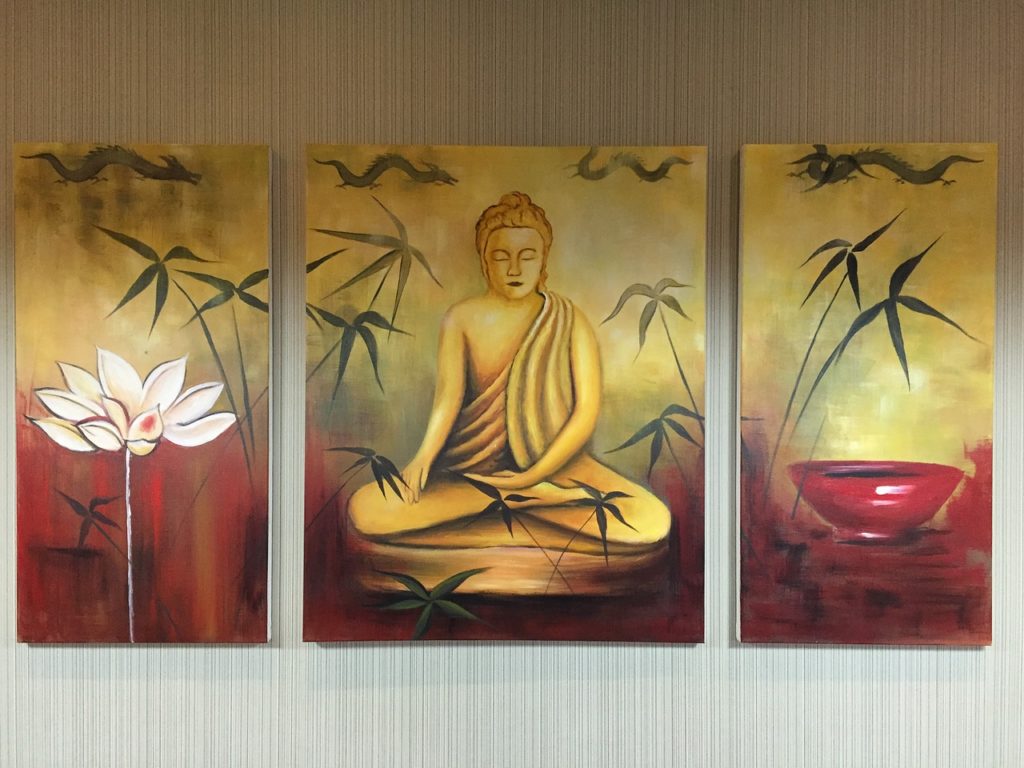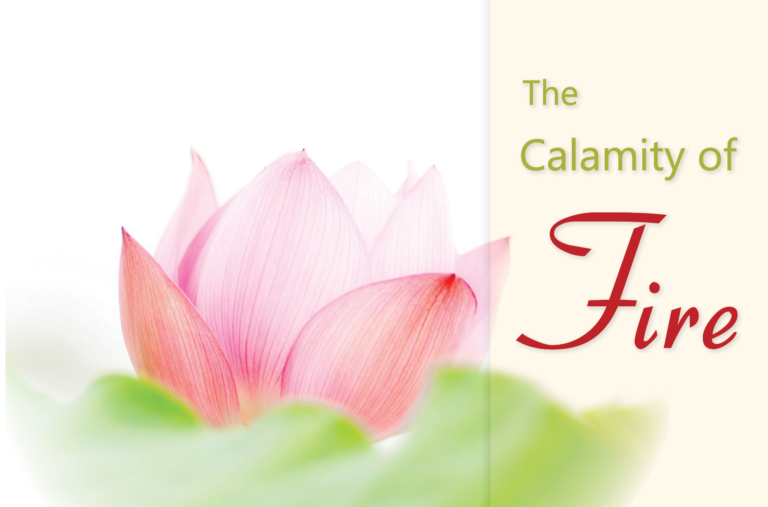
If someone who holds firmly to the name of Avalokitesvara were to find themselves in a fire, no matter how big, they need not fear being burned by it because of the Bodhisattva’s awe-inspiring spiritual powers.
Specifically the passage describes one who “upholds the name.” The Chinese character chi (持), “uphold,” means to hold firmly to or mindfully maintain something. One who upholds the name recites it single-mindedly and with devout reverence. If we hope to escape from any sort of calamity, then we must believe in Avalokitesvara Bodhisattva, his spiritual powers, and his merit. Without such faith, it is hard to obtain the Bodhisattva’s intercession.
The seven calamities each describe external dangers, but these dangers also occur in our minds. For example, the calamity of fire can be likened to the fire of anger. The Sutra of the Teachings Bequeathed by the Buddha states:

“The fires of anger can burn up a forest of merit.”
Anger is like an uncontrollable fire being carried by a fierce wind. In the same way, the Lotus Sutra likens the world to a burning house, caught in the fires of our afflictions. The fires of anger do not lie outside, but are within the mind. At their most severe, anger and hatred can provoke hostility towards others, and acting on this hostility can lead us to do harm. Not only is this morally wrong, but it is spiritually damaging. The harm done by anger can destroy all the roots of goodness.
Where do these fires come from? They arise from the attachment to the self, seeking benefit for ourselves, and having pride in ourselves. Someone once asked the famous Chan master Bankei, “I’m bad-tempered by nature and easily become angered. There’s nothing I can do about it. Can’t you please do something to cure me of this?”
“Oh, this illness is very strange,” Bankei replied. “To be bad-tempered by nature is even more interesting. This old monk has never seen what a bad temperament is like. Why don’t you take it out and show it to me?”
“Venerable, that’s impossible! How can I possibly take it out?”
“See? I tell you to take it out but you cannot do so. Clearly this is not some inherent flaw, but arises from anger and hatred.”
This reply stunned the questioner, and his bad temperament never returned.
Fires, floods, and other calamities are not limited to the tangible and the visible. They can also be like the fires of anger that can burn within our breast when we are insulted and humiliated by others. When insulted, if someone were to shout back with an even louder voice, would the angry expression on that person’s face not resemble a blazing fire?
When we don’t get what we want, the flames of anger and hatred blaze arise because of the fiery desires of the human heart.
———————————————————————————————-
The inability to do as we wish is common in this world, and the only way we will be able to extinguish the fires within the mind is to douse them with the water of wisdom.
———————————————————————————————-
Only when the fires of anger are smothered can we appreciate things like reason and human emotion that come from a mind that is calm and tranquil. As long as we can restrain thoughts of anger, then we can maintain an unperturbed and tranquil attitude no matter what setbacks appear to trouble us. In this way we can transcend any concern over praise or blame, and reach a state described by the Chinese poet Su Shi as “remaining unmoved by the influence of the eight winds.”
Suppose someone were to criticize you and you became angry. If the person is a person of integrity and good character and is criticizing your behavior, then you are likely in the wrong. But even if you are being criticized by a person of ignoble character, in getting angry at that person you set yourself on equal footing with him, and if you were to respond back you would place yourself even lower. Therefore, when a person of integrity criticizes us, we should examine ourselves to see where our errors lie, but when some ignoble individual criticizes us, we should not go down to their level or take it so seriously.
Most people understand this in principle, but we still find it hard to practice. Even the minor affairs of daily life, like someone gossiping at our expense, are enough to stir the mind to unwitting anger. Once the flames of anger are unleashed, we might just destroy even the things we hold dear. Indeed, the human mind is truly like the burning house of The Lotus Sutra.
Although there are myriad phenomena in the universe, each with their own distinctive features, they share the same source. If we can restore the mind to its original state of calm, serenity, and absolute equality, then neither life nor death, neither happiness nor suffering, neither satisfaction nor dissatisfaction, nor anything else will be able to throw our minds into disorder. Even the phenomena of the universe in all their variation would be unable to confuse us. If we can accomplish this, then we have already attained great wisdom.
This great wisdom will grant us the courage to endure any praise or blame, and develop the compassionate sense of equality that is beneficial to all.
Not only is Avalokitesvara Bodhisattva a manifestation of great compassion but also through his compassion to liberate living beings a being of great wisdom and great courage. By making the mind like the mind of Avalokitesvara Bodhisattva and having the great compassion to liberate living beings, we can also participate in Avalokitesvara’s spiritual powers. When we have attained this state, we, too, can fall into a fire and not be burned.
When the fires of anger are about to burn our mind and body, if we single-mindedly call the name of Avalokitesvara Bodhisattva, we will be spared from such a fiery calamity. Is this not an example of Avalokitesvara’s awe-inspiring spiritual powers? But even so, these powers are simply the powers of great compassion, great wisdom, and great courage. When the fires of anger are raging in our breast, if we single-mindedly call his name, Avalokitesvara Bodhisattva will transform into the water of compassion and extinguish the flames.
Source: The Universal Gate: A Commentary on Avalokitesvara’s Universal Gate Sutra, written by Venerable Master Hsing Yun and translated by Translated by Robert Smitheram, Ph.D


